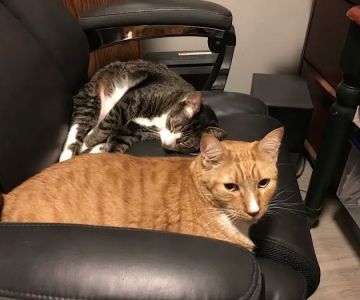Can a Normal Veterinarian Handle Cat Tooth Extractions?
If you've ever had a pet cat and noticed signs of dental discomfort, you may have wondered, "Can my veterinarian handle a tooth extraction for my cat?" It’s a reasonable concern as cat tooth extractions are a delicate procedure that requires skill and knowledge. Not all veterinarians may be equipped or experienced enough to carry out such procedures, and understanding when and why a specialized veterinary surgeon might be needed is essential for the well-being of your pet. In this article, we will discuss the process of tooth extractions for cats, when a general veterinarian can perform them, and when you might need to consult a veterinary dentist or surgeon. By the end, you’ll have a better understanding of the procedure and how to make the best decision for your cat's health.

7541 Roswell Rd, Atlanta, GA 30350, USA
See Details1. What Does a Cat Tooth Extraction Entail?
Cat tooth extractions typically happen when a tooth is damaged, infected, or has reached a point where it causes pain to your pet. The most common reasons for a cat to require a tooth extraction are severe dental disease, broken teeth, and abscesses. During the procedure, the veterinarian will carefully numb the area around the tooth, either using a local anesthetic or general anesthesia, and remove the tooth from the gums and underlying bone.
After the extraction, the veterinarian will clean the area thoroughly to prevent infections and make sure there’s no leftover debris. The recovery process usually involves a few days of rest for your cat, and it’s essential to monitor for any signs of complications like swelling, bleeding, or difficulty eating. Cat dental health is often overlooked, but it plays a crucial role in their overall well-being.
2. Can a General Veterinarian Perform a Tooth Extraction?
In many cases, a general veterinarian can indeed perform a tooth extraction for your cat. Most general veterinarians are trained to handle a variety of common procedures, including tooth extractions. They are well-equipped to manage routine extractions of adult teeth, especially in younger cats or those with fewer dental complications.
However, the complexity of the tooth extraction can influence whether a general veterinarian can safely perform the procedure. If the extraction involves a broken tooth with significant bone involvement, a general veterinarian may refer you to a specialist who has the expertise and tools to perform the extraction more efficiently and safely. Additionally, some cats have unusual dental conditions that require specialized care.
3. When Should You See a Veterinary Dentist or Specialist?
If your cat’s dental issue is more complex, involving root abscesses, impacted teeth, or significant bone damage, you may need to consult a veterinary dentist or specialist. Veterinary dentists have additional training and experience in oral health problems in animals and are better equipped to handle complicated extractions that may require advanced techniques or equipment.
Signs that your cat may need to see a veterinary dentist include:
- Severe gum disease or infections that don’t respond to standard treatments.
- Multiple teeth requiring extraction or complicated extractions involving bone.
- Chronic oral pain or difficulty eating despite standard treatment.
If your veterinarian suggests seeing a specialist, it’s important not to hesitate. Veterinary dentists are highly skilled at handling these situations, ensuring your cat gets the best possible care.
4. How to Prepare for a Cat Tooth Extraction
Preparing for your cat’s tooth extraction is crucial for ensuring a smooth and successful procedure. The first step is to schedule a thorough dental check-up with your veterinarian. During this visit, the vet will assess your cat’s dental health and determine if an extraction is necessary. Depending on the severity of the issue, your cat may need additional testing such as X-rays to examine the roots and bone structure around the tooth.
Once the procedure is scheduled, your veterinarian will provide instructions for preoperative care. This typically includes withholding food and water before the extraction if your cat will be undergoing general anesthesia. You should also ensure that your cat is in good health and up-to-date with vaccinations to prevent complications during the procedure.
5. Post-Extraction Care for Your Cat
After your cat’s tooth extraction, the recovery process is an important step in ensuring that the procedure is successful. Your veterinarian will give you detailed instructions on how to care for your cat post-surgery. This may include administering pain relief medications, ensuring your cat avoids eating hard foods, and monitoring for signs of infection.
It’s also essential to schedule a follow-up visit to ensure your cat is healing properly. This will give your veterinarian an opportunity to check for any complications, such as infection or excessive swelling, and to make sure your cat is comfortable. In most cases, the recovery period is short, and cats are back to their usual self within a week or two.
6. Alternatives to Tooth Extraction for Cats
In some cases, extraction may not be the best solution for your cat. While extractions are common, there are alternative treatments available for some dental conditions. These might include root canal therapy, which aims to save the tooth, or laser therapy to treat periodontal disease. Depending on your cat’s specific needs, your veterinarian may discuss these alternatives as options.
It’s also essential to maintain your cat’s dental health through regular check-ups and professional cleanings to avoid the need for extractions. Good oral hygiene, such as brushing your cat’s teeth at home or using dental treats and toys, can help prevent dental issues from becoming severe and requiring tooth extractions in the first place.
7. Conclusion: Making the Best Decision for Your Cat’s Health
When considering a tooth extraction for your cat, it’s important to trust your veterinarian’s guidance while also being aware of when a referral to a veterinary dentist or specialist might be necessary. Most general veterinarians can perform routine extractions, but for more complicated cases, a veterinary specialist can provide the expertise needed to ensure a safe and successful procedure.
It’s also essential to take good care of your cat’s dental health to prevent extractions from becoming necessary in the future. Regular dental check-ups, proper oral hygiene, and timely intervention can help keep your cat’s teeth healthy and reduce the risk of needing invasive dental procedures.
If your cat is facing a tooth extraction, be sure to consult with your veterinarian and make an informed decision based on the complexity of the situation. Whether your cat requires a standard extraction or specialized care, there are plenty of treatment options available to ensure your furry friend remains happy and healthy.
SEO Title: Can a Normal Veterinarian Handle Cat Tooth Extractions? SEO Keywords: veterinarian cat tooth extraction, cat dental care, veterinary dentist, cat tooth extraction procedure, can a veterinarian handle cat tooth extraction SEO Description: Learn if a normal veterinarian can handle your cat’s tooth extraction, what’s involved in the procedure, and when to seek a veterinary dentist for more complex cases.









